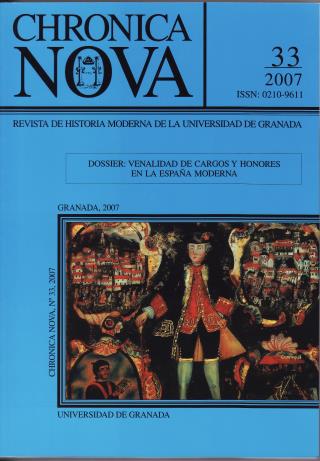Moral Economy of Healthcare. Hospital Consolidation in 16th Century Granada
DOI:
https://doi.org/10.30827/cn.v0i33.1775Keywords:
Hospitals, Charity, Healthcare, Sixteenth Century, Church, GranadaAbstract
During the last third of the 16th century, the Spanish Crown promoted different initiatives to rationalise and centralise hospital services in Castile. Our aim was to characterise the contemporary significance and extent of this type of reform. One reform that was repeatedly proposed and eventually ended in failure was attempted in the city and archbishopric of Granada; its investigation constitutes the specific objective of this study. Prelates Juan Méndez de Salvatierra and Pedro de Castro acted decisively against the innovations planned by agents of the Crown. Pedro de Castro blocked reforms independently proposed by Joan Alonso de Moscoso and Fernando Niño de Guevara, Bishop of Guadix and President of the Chancellery, respectively. The client-centred approach of hospital healthcare alongside the defence of ecclesiastical hospital institutions by the archbishopric, made hospital consolidation unfeasible. The Hospitals of Juan de Dios and Santa Ana, which represented mendicant charity and counter-reform piety, respectively, were key pillars of this resistance against centralization.
Downloads
Downloads
Published
How to Cite
Issue
Section
License
Nuestra revista se atiene a las recomendaciones para la implementación del Artículo 37 Difusión en Acceso Abierto de la Ley de la Ciencia, la Tecnología y la Innovación:
- Los/as autores/as cuyas contribuciones sean aceptadas para su publicación en esta revista conservarán el derecho no exclusivo de utilizar sus contribuciones con fines académicos, de investigación y educativos, incluyendo el auto-archivo o depósito de los artículos aceptados en repositorios institucionales o temáticos de acceso abierto de cualquier tipo en un plazo máximo de seis meses.
- Preferiblemente se permitirá el uso de la versión publicada de las contribuciones científicas, que estarán accesibles en abierto tan pronto como sea posible.
-
Que en caso de que el trabajo sea aprobado para su publicación, el/la autor/a autoriza de manera ilimitada en el tiempo a la entidad editora para que incluya dicho texto en Chronica Nova y pueda reproducirlo, editarlo, distribuirlo, exhibirlo y comunicarlo en el país y en el extranjero por medios impresos, electrónicos, CD, Internet o cualquier otro medio conocido o por conocer.






 ISSN-e: 2445-1908
ISSN-e: 2445-1908










